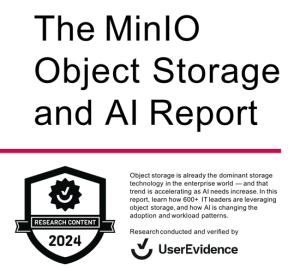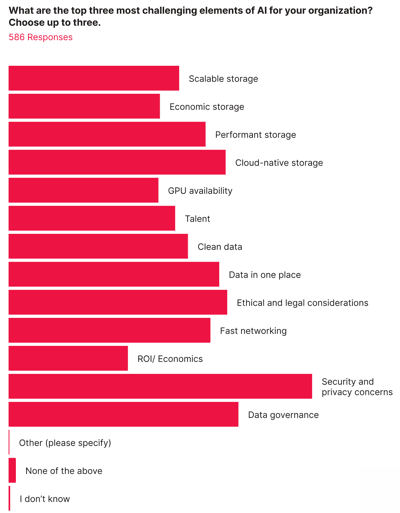Impact of AI on Storage Infrastructure
New findings from MinIO and UserEvidence in their Object Storage and AI Report over 656 IT companies
This is a Press Release edited by StorageNewsletter.com on December 20, 2024 at 2:01 pmMinIO, Inc. announced the findings of its Object Storage and AI Report, which surveyed 656 IT companies on their storage and AI priorities as part of a primary research initiative with UserEvidence, Inc.
 The survey reveals key insights into how organizations are leveraging object storage for AI, ML and data-intensive workloads, as well as the evolving demands placed on storage infrastructure to handle the scale and speed requirements of modern AI applications.
The survey reveals key insights into how organizations are leveraging object storage for AI, ML and data-intensive workloads, as well as the evolving demands placed on storage infrastructure to handle the scale and speed requirements of modern AI applications.
Perhaps the biggest takeaway from the research is the ubiquity of object storage. Respondents indicated that 70% of the enterprise’s data was in object storage and it was expected to grow to 75% over the next 2 years.
The reason for the growth was AI. ‘Support AI’ was the most popular reason why IT companies are adopting object storage at their organization. Performance and scalability rounded out the top 3.
“This research confirms what MinIO, AWS, Azure and Google already know – that object storage is the storage technology of the cloud – public, private or edge,” said Jonathan Symonds, CMO, MinIO. “What is more interesting, however, is the expected acceleration of adoption, driven by GenAI workloads. Modern object stores are uniquely qualified to meet the demands of these workloads – namely throughput performance, immutability and exascale. We are keen to watch this research evolve as enterprises build new storage architectures to support their AI ambitions.“
While the research shows AI to be a key adoption driver for object storage, other workloads are equally critical, namely advanced analytics and modern datalakes and lakehouses. IT companies were particularly enthusiastic about modern datalakes and lakehouses, with 92% of respondents indicating that they already have one in place or plan to build one.
Another interesting trend is revealed when looking at deployment models. Both the public cloud and the private cloud are expected to grow their share of AI data over the next 12-24 months. While the majority of respondents indicated that their overall infrastructure was primarily in the public cloud, 68% were concerned about the cost of running AI workloads. Looking specifically at current approaches to running AI/ML workloads, the majority of IT companies cite a hybrid cloud approach as the most popular choice.
AI deployments still come with challenges. IT companies cited security and privacy (44%), data governance (27%), and cloud-native storage (25%) as the 3 biggest challenges to AI success at their organization. This data points to one of the reasons enterprises repatriate data from public to private cloud-more control over security and privacy. This, and the concerns around cloud-native storage, reflects a larger trend of ensuring data portability.
“This work represents one of the most comprehensive looks at the AI storage landscape and there are some eye-opening findings,” noted Ray Rhodes, co-founder, UserEvidence. “IT leaders are clear in their preference for object storage – a finding that transcended company size or geography. We look forward to partnering with MinIO on more research in this key area.“














 Subscribe to our free daily newsletter
Subscribe to our free daily newsletter

